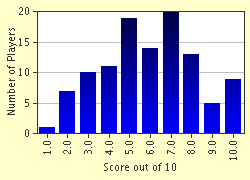Quiz Answer Key and Fun Facts
1. "And thrice threefold the gates; three folds were brass." This is an example of:
2. What literary term comes to mind when you hear the following dialogue? "Then, sir, she should have a supercilious knowledge in accounts; and as she grew up, I would have her instructed in geometry, that she might know something of the contagious countries."
3. "Take me to you, imprison me, for I, / Except you enthrall me, never shall be free, / Nor ever chaste, except you ravish me." What literary device is John Donne using here?
4. "...Which tempted our attempt, and wrought our fall." What rhetorical device is employed in this clause?
5. "Whether the nymph shall break Diana's law, / Or some frail china jar receive a flaw; / Or stain her honour, or her new brocade, / Forget her pray'rs, or miss a masquerade / Or lose her heart, or necklace, at a ball . . . " What device is Alexander Pope employing in this passage?
6. Which of the following novels by Jane Austen is a parody?
7. Which of the following is a ballad opera?
8. Which of the following is NOT an allegory?
9. Which of the following is not one of the unities?
10. Which of the following is not a mock heroic?
Source: Author
skylarb
This quiz was reviewed by FunTrivia editor
bullymom before going online.
Any errors found in FunTrivia content are routinely corrected through our feedback system.


